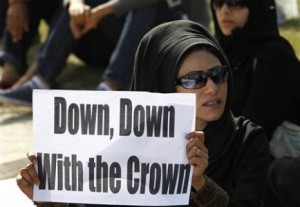
Bahrain ordered the lifting of an emergency law introduced to quash anti-government protests as opposition figures went on trial for allegedly plotting against the state.
The Bahraini government imposed the three-month emergency rule in mid-March as it battled to contain street protests inspired by the Arab revolts sweeping across the Middle East early this year. The decision, which goes into effect on 1 June, two weeks earlier than planned, comes as 21 opposition figures and political activists, accused with attempting to overthrow the Sunni minority government, go on trial in a special court established under the emergency law.
Since the Shia-led street protests that broke out on 15 February calling for greater political and civil rights, Bahrain has intensified its crackdown against the Shia majority, rounding up dozens of opposition figures and activists and putting them on trial, razing mosques and firing hundreds of professionals from their jobs. Bahrain’s Shia Muslim population – some 70 per cent of the 1.2 million-strong population – have long complained of bias and discrimination, particularly in the fields of healthcare, housing and jobs.
Among the activists on trial is Abdulhadi al-Khawaja, the country’s leading human rights defender. His relatives claim that police beat him unconscious at his home during a raid last month before being taken away.
Also charged is the opposition figure Abdul Jalil al-Singace, who was among several arrested last year for conspiring to overthrow the government and later released to calm tensions.
 The defendants have all pleaded not guilty to the charges, which include having links to “a terrorist organisation working for a foreign country,” thought to refer to the Iranian-backed Lebanese militia Hezbollah.
The defendants have all pleaded not guilty to the charges, which include having links to “a terrorist organisation working for a foreign country,” thought to refer to the Iranian-backed Lebanese militia Hezbollah.
Nearly 50 medics who treated injured protesters are also to go on trial in the same court at a later date, while the editors of the opposition newspaper Al-Wasat will also be tried for unethical coverage of the protests.
Faced with unprecedented opposition to its authority from the protesters, Bahrain asked its neighbouring Sunni ally Saudi Arabia in March to send in troops to help quell the protests, which left more than 30 dead.
The move attracted anger in some parts of the Arab world. Iran condemned the intervention and criticised the arrests of opposition figures, while Iraq’s Prime Minister, Nouri al-Maliki, warned that Saudi involvement in Bahrain could ignite a sectarian war in the region. Independent

Leave a Reply
You must be logged in to post a comment.